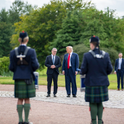This week, we learned three important things about Brexit.
Firstly, with David Davis and Michel Barnier finally kicking off Brexit talks on 19 June, the UK has accepted that the negotiations will be phased in the way the EU demanded.
Only if sufficient progress is made on the rights of citizens, the UK’s Brexit bill and the impact of Brexit on Ireland will EU negotiators turn to the future UK-EU relationship. That means there will be no formal trade talks until, at the earliest, October—six months into negotiations.
Secondly, on 20 June, the Chancellor of the Exchequer Phillip Hammond finally admitted the need to negotiate “mutually beneficial transitional arrangements”, which he admits could last for years, to bridge the gap between the UK’s departure from the EU and its arrival at some future and final destination.
Thirdly, following the mistimed early general election, the formal state opening of Parliament on 21 June saw the government set out its legislative programme for the next two years in the Queen’s Speech.
If some expected that the uncertain outcome of the election might have pushed Theresa May towards a softer Brexit, nothing in the speech indicates a change from the direction of travel set by the Prime Minister in January in her Lancaster House speech. Rather, as part of the “taking back of control” over trade, the government will introduce a Trade Bill and a Customs Bill to enable the UK “to conduct its own independent trade policy.”
The real significance of these events is their cumulative effect. The UK will be outside the EU in less than two years, without a final trade deal with the EU—hence the urgent need to focus minds on transitional arrangements. As to what that interim framework might look like, the ambition to legislate for an independent trade policy would seem to restrict the options available to the UK.
There has been discussion of the UK remaining in the EU’s Customs Union, including on an interim basis. However, the essential feature of a Customs Union is that its members collectively agree on a common policy on trade with non-members of the Union. They do not—and cannot—conduct their own independent trade policies.
In his Mansion House speech, the Chancellor floated an alternative idea of an “implementation period, outside of the Customs Union, but with current customs border arrangements remaining in place.”
This might look something like Turkey’s arrangements with the EU. But again, that agreement requires Turkey to align its trade policies with those of the EU in order to secure the free movement of goods—something that the proposed trade legislation set out in the Queen’s Speech suggests the United Kingdom is not keen to pursue.
The obvious alternative option would be for the UK to seek to rejoin the European Free Trade Association (EFTA) and then negotiate access to the Single Market through the European Economic Area Agreement. This would allow the UK to have its own trade policy while taking advantage of the free trade deals that the EFTA states have negotiated.
But having negotiated its way back into the Single Market through EFTA, the UK might well find that this ends up as a permanent rather than a temporary arrangement. The aim of negotiating a comprehensive trade agreement with the EU might, then, simply be put off indefinitely. The result? A UK that finds itself lost in transition.












